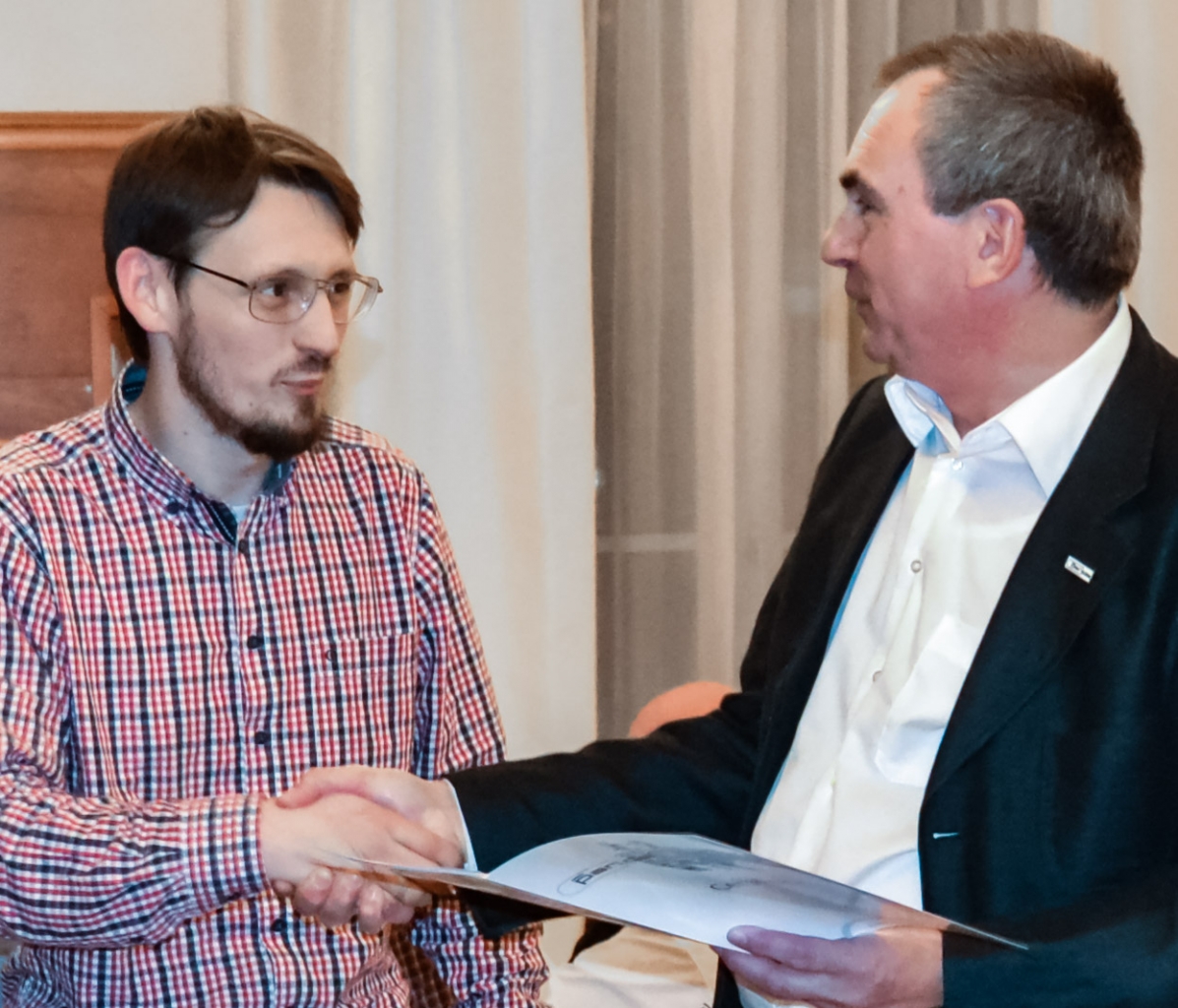Sie sehen momentan nur den öffentlichen Teil des GSI-Kuriers.
Um auch die GSI-internen Artikel angezeigt zu bekommen,
melden sie sich bitte an

Kurier - Mitteilungen von und für Mitarbeitende
Ausgabe: 47-2018 | 19.11. - 25.11.
Nachrichten
Nachrichten
Panda-Kollaboration zeichnet Doktoranden aus: PhD-Preis für Dr. Mustafa Schmidt

Foto: Udo Kurilla, GSI
Dr. Mustafa Schmidt hat für seine Promotionsarbeit "Particle Identification with the Endcap Disc DIRC for PANDA" bei GSI und FAIR sowie an der Justus-Liebig-Universität Gießen den Panda PhD-Preis 2018 erhalten. Übergeben wurde die Auszeichnung beim jüngsten Panda-Kollaborationstreffen an der GSI in Darmstadt durch den Sprecher der Panda-Kollaboration, Klaus Peters von GSI.
Der 33 Jahre alte Physiker Mustafa Schmidt hat vor seiner Promotion bereits mehrere Jahre in der Industrie gearbeitet und hat den Preis, der mit 200 Euro Preisgeld sowie einem Zertifikat dotiert ist, für seine Dissertation zum Thema „Particle Identification with the Endcap Disc DIRC for PANDA“ erhalten. Betreuer der Promotion war Professor Dr. Michael Düren von der Justus-Liebig-Universität Gießen.
Der PhD-Preis wird seit 2013 einmal jährlich von der Panda-Kollaboration für die beste Dissertation verliehen, die im Rahmen des Panda-Experiments erstellt wurde. Panda ist eines der Schlüsselexperimente am künftigen Beschleunigerzentrum FAIR, im Mittelpunkt stehen die Forschung mit Antimaterie sowie verschiedenen Themen rund um die schwache und die starke Kraft, exotische Zustände von Materie und die Struktur von Hadronen. In der Kollaboration arbeiten mehr als 500 Wissenschaftler aus 20 Ländern zusammen. Dr. Mustafa Schmidt beschäftigt sich in seiner Dissertation mit einem Cherenkov Detektor auf Basis der DIRC Technologie als wichtigem Bestandteil des Panda-Detektors, der an der FAIR-Beschleunigeranlage zur der Identifikation geladener Teilchen aufgebaut wird.
Kandidaten für den PhD-Preis werden von der jeweiligen Promotionsbetreuung nominiert. Voraussetzung ist neben einem direkten Bezug zur Panda-Forschung die Bewertung der Promotion mit mindestens „sehr gut“. Bis zu drei Kandidaten kommen in die engere Auswahl und dürfen ihre Arbeit beim Panda-Kollaborationsmeeting präsentieren. Die Entscheidung erfolgt durch ein von der Panda-Kollaboration benanntes Komitee. Mit dem PhD-Preis möchte die Panda-Kollaboration die Beiträge von Studenten zum Panda-Projekt besonders würdigen.
Panda Collaboration honors PhD: Prize for Dr. Mustafa Schmidt

Photo: Dr. Mustafa Schmidt
Dr. Mustafa Schmidt has received the Panda PhD Prize 2018 for his doctoral thesis "Particle Identification with the Endcap Disc DIRC for PANDA" at GSI, FAIR, and the Justus Liebig University in Giessen. The award was presented by the spokesman of the Panda Collaboration, Klaus Peters from GSI, at the most recent Panda Collaboration meeting at GSI in Darmstadt.
Physicist Mustafa Schmidt, 33, who worked also for a couple of years in industry before his PhD, received the prize of €200 and a certificate for his dissertation titled Particle identification with the Endcap Disc DIRC for PANDA. His doctoral advisor was Prof. Dr. Michael Düren from the Justus Liebig University in Giessen.
The Panda Collaboration has awarded the PhD Prize once per year since 2013 in order to honor the best dissertation written in connection with the Panda Experiment. Panda will be one of the key experiments of the future accelerator center FAIR. The experiment focuses on antimatter research as well as on various topics related to the weak and the strong force, exotic states of matter, and the structure of hadrons. More than 500 scientists from 20 countries currently work in the Panda Collaboration. In his dissertation, Dr. Schmidt studied the Endcap Disc DIRC, a Cherenkov detector that forms one of the main components of the charged particle identification of the Panda detector, which is being built at the FAIR accelerator facility.
Candidates for the PhD Prize are nominated by their doctoral advisors. In addition to being directly related to the Panda Experiment, the nominees’ doctoral degrees must have received a rating of “very good” or better. Up to three candidates are shortlisted for the award and can present their dissertations at the Panda Collaboration meeting. The winner is chosen by a committee that is appointed for this task by the Panda Collaboration. The Panda Collaboration awards the PhD Prize to specifically honor students’ contributions to the Panda project.
Prof. Klaus Peters for the PANDA collaboration
Die aktuellen internen Stellenausschreibungen finden Sie auch unter www.gsi.de/jobsintern
Gruppe PER-PAD










